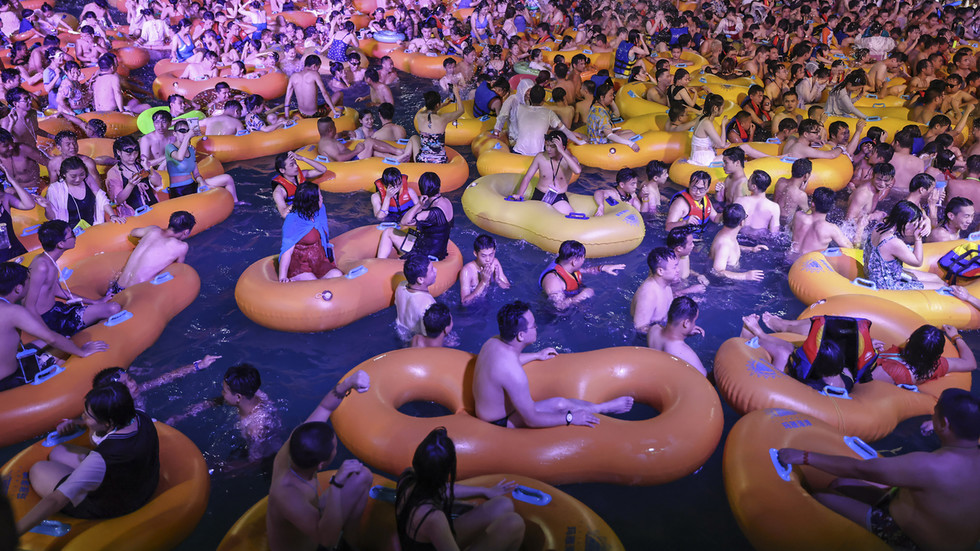
People watch a performance as they cool off in a swimming pool in Wuhan, central China's Hubei Province, August 15, 2020. /AFP
People watch a performance as they cool off in a swimming pool in Wuhan, central China's Hubei Province, August 15, 2020. /AFP
Editor's note: Tom Fowdy is a British political and international relations analyst and a graduate of Durham and Oxford universities. He writes on topics pertaining to China, the DPRK, Britain and the U.S. The article reflects the author's opinions, and not necessarily the views of CGTN.
Throughout the week a photo circulated virally online and in Western media of a thriving pool party in Wuhan, China. Packed with individuals, it was heralded as an iconic scene in a dramatic transformation in the area's fortunes. From once being the focus of enduring a gruelling lockdown over the COVID-19 (the first place in the world to do so) to having completely eradicated the virus to the point that mass social activities were now safe, it not surprisingly caught the attention of journalists and spectators.
Some circles online however were not thrilled to see the image and outcome. Across social media, some vented abuse and bitterness as other places across the world continue to battle the virus. An Australian tabloid newspaper, the Daily Telegraph ran with a scathing anti-China headline saying "China's Big Party: Life's a Beach in Wuhan as World Pays Virus Price" and accused China of "exacting revenge on Australia."
Despite this, the photograph of the party serves as a symbolic reminder as to how the area has transformed from once being a perceived subordinate in people's minds, with early coverage having portrayed its strict lockdown in dystopian terms, to a success story which has become a de-facto envy of other places in the world.
Although political blame games have persisted, the image has been powerful enough to shift the emphasis on people's minds from what they believed without hindsight to be an overwhelming failure, to triumph. The locals have certainly earned their right to enjoy themselves.
Since the beginning of the pandemic, the conversation surrounding Wuhan has been rooted strongly in the Western discourse that China exists as a "subordinate other" that is a nation and people that do not exist on "equal footing" with the enlightened and civilized ways of the West.
COVID-19 placed this in plain sight. The initial outbreak in Wuhan was portrayed with a sense of complacency in many Western countries because of prevailing discourses that associated the spread of disease with "civilizational inferiority" hence many outlets had a misleading focus on culinary habits, hygiene and so on. The narrative made it a "Chinese problem" not anyone else's.

Tourists have fun at Playa Maya Water Park in Wuhan, central China's Hubei Province, August 15, 2020. /Xinhua
Tourists have fun at Playa Maya Water Park in Wuhan, central China's Hubei Province, August 15, 2020. /Xinhua
As a result of this complacent mind-set, the outbreak and the city's strict lockdown was subsequently portrayed by the media in highly dystopian and contrasting terms, underlying a further set of Western discourses that "things like this do not happen here" – disasters and disease outbreaks are only something many Westerners watch on television and never experience directly.
Given this, the scale and dramatic nature of the lockdown was also portrayed as oppressive, controlling and Orwellian. This was not a situation they could emphasize with. Kenneth Roth of Human Rights Watch even attempted to portray the situation in Hubei as a form of human rights abuse, all building into a broader discourse that because of the West's superiority, this was unthinkable at home.
Of course, all of this came with a dramatic lack of hindsight. When the COVID-19 proceeded to emerge in other areas of the world, the logic of lockdowns shifted dramatically from something frightening and dystopian into a necessity. The realization soon emerged that the Wuhan and Hubei lockdown was not a horrific failure, but something which successfully contained and eradicated the epidemic.
Many found this is hard to take. The superiority complex of the West subsequently transformed into a political deflection which throughout April and May became obsessed with denying this reality by arguing things were worse than what they seemed, for example repeatedly claiming the death toll was understated. As other countries struggled, the image of Wuhan as a "dystopian nightmare" had to be reaffirmed.
Yet as time has gone by, that depiction has become less and less credible as the gulf between other countries and China in combating the virus has continued to grow. States whom rushed out of lockdown too quickly in pursuit of business interests, such as the United States, have continued to suffer from the COVID-19, whereas China's strict and uncompromising lockdown strategies, as well as overwhelming testing regimes which included testing 11 million people in Wuhan before the city's reopening, have not only returned the original epicenter to normality, but successfully quashed new smaller outbreaks in Beijing, Xinjiang and Liaoning at the same time.
Therefore, as the photo of a busy pool party circulated on the internet, one message sank home irrespective of the reactions, is that Wuhan has ultimately succeeded and returned to normal. The city that was portrayed in starkly negative and apocalyptic terms by the Western media had in fact succeeded where many other places around the world are still struggling to do so.
With the city's strict lockdown having been initially portrayed as unthinkable, terrifying and even oppressive by some commentators, in the end it is difficult to deny that this has won out. The people of Wuhan have earned their right to enjoy themselves.
(If you want to contribute and have specific expertise, please contact us at opinions@cgtn.com.)